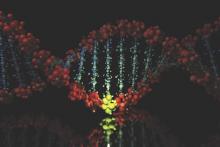Certain cases of female infertility appear to be caused by mutations in the TUBB8 gene that impair microtubule behavior and meiotic spindle assembly, thus preventing oocyte maturation, according to a report published online Jan. 20 in the New England Journal of Medicine.
The findings from a series of genetic analyses “provide the basis for developing diagnostic tools” to identify women who carry these mutations, and also point the way to as-yet undiscovered genetic mutations that also contribute to the arrest of oocyte maturation, wrote Ruizhi Feng, Ph.D., of State Key Laboratory of Genetic Engineering, Fudan University, Shanghai, and his associates.
Immature oocytes are arrested at a phase of development before complete meiosis occurs. Among women seeking in vitro fertilization “it is common for some oocytes to remain immature after ovarian stimulation and administration of human chorionic gonadotropin, but complete arrest of oocyte maturation has been reported in only a few women, and nothing is known about the genetic cause of this phenotype,” they noted.
The investigators identified a four-generation family affected with a rare pattern of inheritance of female infertility, which was found to stem from complete oocyte maturation arrest. They sequenced the exomes of three affected and two unaffected women in the family. All the affected women, but none of the unaffected women, carried a mutation in the TUBB8 gene that encodes for a tubulin isotope. The researchers then found six other TUBB8 mutations (all paternally transmitted) in seven women from four other families with similar oocyte maturation arrest, as well as de novo mutations in two women from two additional families. All of the oocytes assessed either had abnormal spindles or no detectable spindles.
The investigators hypothesized that TUBB8 influences the self-organization of microtubules, and thus meiotic spindle assembly and chromosome orientation, in oocytes. Further analyses confirmed this and showed that the mutations affected tubulin heterodimer folding and assembly in vitro, caused “a spectrum of striking microtubule phenotypes” in cultured HeLa cells, and markedly impaired microtubule dynamics in in-vivo yeast colonies (N Engl J Med 2016;374:223-32. doi:10.1056/NEJMoa1510791).
Finally, to establish a causal relationship between the TUBB8 mutations and infertility, the investigators introduced them into mouse and human oocytes. The TUBB8 mutations caused maturation defects “that precisely mimic the infertility phenotype,” while nonmutated TUBB8 did not, they reported.
“We conclude from these observations that mutations in TUBB8 cause oocyte maturation arrest and that TUBB8 has a key role in meiotic spindle assembly and maturation in human oocytes,” Dr. Feng and his associates wrote.
The National Basic Research Program of China, the Shanghai Key Scientific Research Program, the National Natural Science Foundation of China, the 111 Project, and the U.S. National Institutes of Health supported the study. Dr. Feng and his associates reported having no conflicts of interest.


